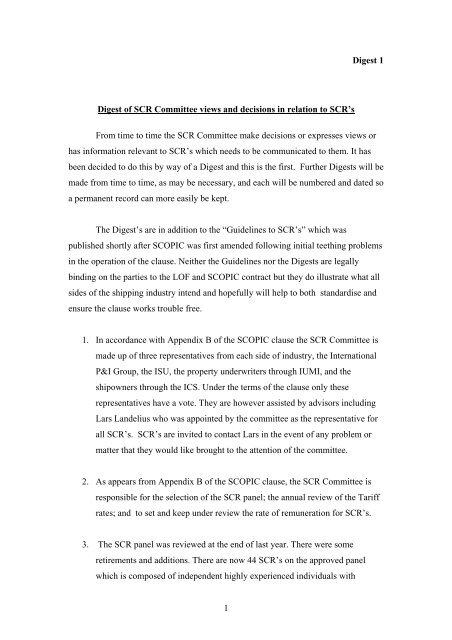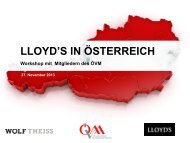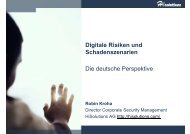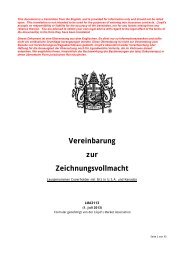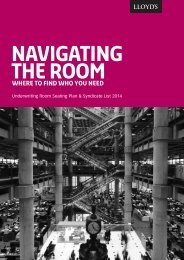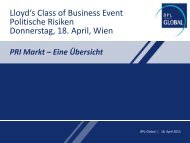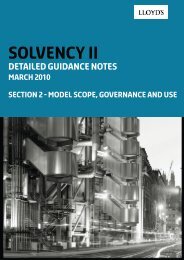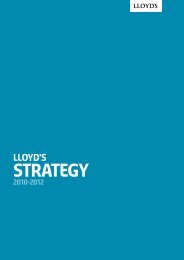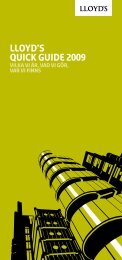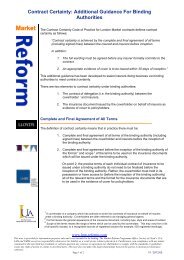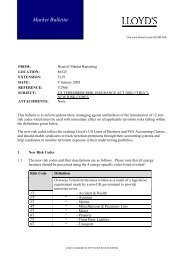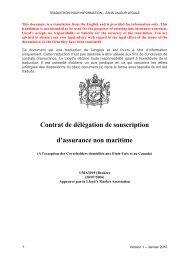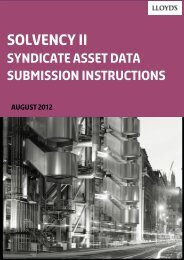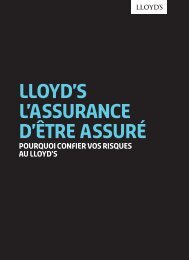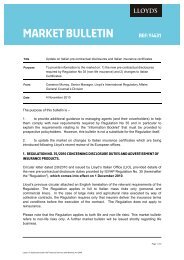SCR Digest 1 (35KB, pdf) - Lloyd's
SCR Digest 1 (35KB, pdf) - Lloyd's
SCR Digest 1 (35KB, pdf) - Lloyd's
You also want an ePaper? Increase the reach of your titles
YUMPU automatically turns print PDFs into web optimized ePapers that Google loves.
<strong>Digest</strong> of <strong>SCR</strong> Committee views and decisions in relation to <strong>SCR</strong>’s<br />
<strong>Digest</strong> 1<br />
From time to time the <strong>SCR</strong> Committee make decisions or expresses views or<br />
has information relevant to <strong>SCR</strong>’s which needs to be communicated to them. It has<br />
been decided to do this by way of a <strong>Digest</strong> and this is the first. Further <strong>Digest</strong>s will be<br />
made from time to time, as may be necessary, and each will be numbered and dated so<br />
a permanent record can more easily be kept.<br />
The <strong>Digest</strong>’s are in addition to the “Guidelines to <strong>SCR</strong>’s” which was<br />
published shortly after SCOPIC was first amended following initial teething problems<br />
in the operation of the clause. Neither the Guidelines nor the <strong>Digest</strong>s are legally<br />
binding on the parties to the LOF and SCOPIC contract but they do illustrate what all<br />
sides of the shipping industry intend and hopefully will help to both standardise and<br />
ensure the clause works trouble free.<br />
1. In accordance with Appendix B of the SCOPIC clause the <strong>SCR</strong> Committee is<br />
made up of three representatives from each side of industry, the International<br />
P&I Group, the ISU, the property underwriters through IUMI, and the<br />
shipowners through the ICS. Under the terms of the clause only these<br />
representatives have a vote. They are however assisted by advisors including<br />
Lars Landelius who was appointed by the committee as the representative for<br />
all <strong>SCR</strong>’s. <strong>SCR</strong>’s are invited to contact Lars in the event of any problem or<br />
matter that they would like brought to the attention of the committee.<br />
2. As appears from Appendix B of the SCOPIC clause, the <strong>SCR</strong> Committee is<br />
responsible for the selection of the <strong>SCR</strong> panel; the annual review of the Tariff<br />
rates; and to set and keep under review the rate of remuneration for <strong>SCR</strong>’s.<br />
3. The <strong>SCR</strong> panel was reviewed at the end of last year. There were some<br />
retirements and additions. There are now 44 <strong>SCR</strong>’s on the approved panel<br />
which is composed of independent highly experienced individuals with<br />
1
salvage knowledge and experience. The full list can be obtained on the Lloyds<br />
website. (www.lloydsagency.com)<br />
4. The tariff rates for personnel are currently under review. You will be<br />
advised as and when any decision is made to vary the current rates. There is, at<br />
present, no move to amend the rates for tugs and equipment.<br />
5. It was agreed at the end of last year that the SCOPIC clause should be<br />
amended with effect from the 1 st January 2005. The new edition SCOPIC<br />
2005, will be found on the Lloyds web site. So the amendments can easily be<br />
noted a summary of them is attached. Of particular note to <strong>SCR</strong>’s is the<br />
amendment to clause 1 (a) of Appendix A where the word ‘diver’ has been<br />
replaced with the words :-<br />
”HSE qualified diver or his equivalent but excluding saturation or<br />
mixed gas divers (whose rate should be agreed with the <strong>SCR</strong> or<br />
determined by the Arbitrator)”<br />
It will also be seen that, in advance of the current rate review, the rate for such<br />
a person has been increased to 900 US dollars per day<br />
6. Of the other amendments the only real changes of substance are those to sub<br />
clauses 5, 6, and 7. These changes are designed to cope with currency<br />
fluctuations between the date of termination of the services and the date of the<br />
article 13 award or settlement. The amendments to sub clauses 6 and 7 are not<br />
of particular concern to <strong>SCR</strong>’s but specific attention is drawn to the new sub<br />
clause 5 (iii) (c) which provides that all expenses incurred be converted to the<br />
US $ at the rate prevailing at the termination of the services.<br />
7. <strong>SCR</strong> was originally an acronym for “Shipowners Casualty Representative”<br />
and the full name still features as such in some old documents such as the<br />
originally printed SCOPIC clause. This gave rise to problems for some<br />
authorities took the title to mean a shipowners representative in respect of<br />
many other matters, such as port dues. It will be seen that to correct this the<br />
2
title was amended to “Special Casualty Representative” in May 2001 which<br />
conveniently kept the acronym to the same as before.<br />
8. Whilst an <strong>SCR</strong> is appointed by the shipowners (SCOPIC sub clause 11) and<br />
his fees are ultimately paid by the property underwriters (ship and Cargo) and<br />
the liability underwriters (P & I ) (see Code of Practice between International<br />
Group of P&I Clubs and London Property underwriters), it should be<br />
remembered that he is totally independent of, and any actions that he takes in<br />
furtherance of his duties should not be influenced by, the views of any of the<br />
parties interested in the salvage operation.<br />
9. <strong>SCR</strong>’s must be appointed from the <strong>SCR</strong> panel (Appendix B clause 1 (a)). On<br />
occasions in the past a few have been appointed who are not on the panel. The<br />
Committee are doing all they can to discourage this. Further, it was always<br />
intended that the appointed <strong>SCR</strong> should attend the casualty throughout the<br />
service though it is recognised that in some circumstances a replacement may<br />
be necessary. (see Appendix B clause 6). In some instances a replacement<br />
<strong>SCR</strong> has been appointed from outside the panel. This is contrary to the<br />
provisions of Appendix B clause 6 (b) and the committee strongly discourages<br />
it. All replacements should be from the panel. An <strong>SCR</strong> has no power or<br />
authority to delegate the job and if he wishes to be relieved must advise all<br />
parties and leave it to the shipowners to appoint a replacement.<br />
10. The Committee would like to encourage the use of trainee <strong>SCR</strong>’s but<br />
emphasise that the consent of representatives of all the principal parties should<br />
first be sought. The cost of the attendance must be for the <strong>SCR</strong> himself or his<br />
firm but in appropriate cases and by prior agreement the parties to the contract<br />
may be prepared to pay the expenses of the trainee and in some circumstances<br />
a fee for his attendance. It is suggested that an <strong>SCR</strong> who wishes to develop a<br />
trainee or feels that a case justifies an assistant, discuss the issue with his<br />
instructing party.<br />
3
11. The Committee feel regular meetings of the <strong>SCR</strong>’s are desirable so that<br />
experiences can be shared and problems discussed with the <strong>SCR</strong> committee.<br />
To date John Noble of the Salvage Association has kindly provided a venue<br />
for this, usually following the bi annual March conference arranged by the<br />
ISU. These have proved to be quite useful but the committee feel more should<br />
be done to inform <strong>SCR</strong>’s what is expected of them. Accordingly it will be<br />
arranging for a seminar for <strong>SCR</strong>’s on Thursday the 10 th March at a venue in<br />
London to be fixed, where papers can be presented on relevant aspects of the<br />
job and experiences shared. Would any <strong>SCR</strong> who wishes to attend advise, as<br />
soon as practicable, Kevin Clarke of Lloyds. If any <strong>SCR</strong> would like to make a<br />
presentation or if there are any particular problems you would like discussed it<br />
would be helpful to have prior notice.<br />
12. In recent times there has been some discussion as to the liability of an <strong>SCR</strong>. In<br />
this regard attention is drawn to paragraph 8 of the “Guidelines for <strong>SCR</strong>’s<br />
which deals with both personal injury and professional liability of an <strong>SCR</strong>.<br />
Whilst an <strong>SCR</strong> is unlikely to have any liability for the failure or misconduct<br />
of a salvage operation because the Salvage Master always remains in charge<br />
of the operation ( Appendix B paragraph 3) he still has duties to the parties<br />
which could impose a liability on him in the event of failure to carry them out<br />
properly. For example if he incorrectly and negligently reports events or<br />
equipment used by the salvor during the operation and the owners of ship and<br />
cargo suffered damage as a result. The Committee therefore emphasise the<br />
need for <strong>SCR</strong>’s to take out both appropriate personal injury and liability<br />
insurance.<br />
13. It has always been envisaged that an <strong>SCR</strong> may subsequently have to amplify<br />
his reports or be called to give evidence before a salvage arbitrator. However<br />
recent experience has indicated that some guidance as to what a <strong>SCR</strong> should<br />
do in such circumstances is needed. This particular problem is currently being<br />
considered by the Committee and it is hoped some guidance will be given in<br />
the near future.<br />
4
Meanwhile, the Committee recognise that an <strong>SCR</strong> may be called to give<br />
evidence in a case which is not connected with the assessment of the salvage<br />
operation in which he has been engaged, but involves something related to it,<br />
such as a claim by cargo against ship for unseaworthness or an insurance<br />
claim arising from the casualty. Whilst a court or arbitrator can order the<br />
attendance of a witness the Committee wish to strongly discourage an <strong>SCR</strong><br />
from being called to give evidence in relation to non salvage issues for if any<br />
one of the parties to the salvage contract fear evidence may be given against<br />
them in an case other than the salvage arbitration, it may discourage them<br />
from fully co-operating with the <strong>SCR</strong> and discourage them from disclosing<br />
matters that would be in the general interests of all involved in the salvage<br />
operation. Ultimately it could effect the degree of cooperation and confidence<br />
that any of the parties have as to the independence of the <strong>SCR</strong>. For this reason<br />
it will be seen that an additional sentence has been added to sub clause 11 -<br />
"Any <strong>SCR</strong> so appointed shall not be called upon by any of the<br />
parties hereto to give evidence relating to non salvage issues"<br />
14. The <strong>SCR</strong> Guidelines specifically request that interim and final reports be<br />
issued within one month, or sooner if it is possible (paragraph 6 (e) (iii)). In<br />
many cases this is not complied with. Please do every thing you can to<br />
produce these as quickly as possible and, if waiting for some final detail<br />
which is long in coming, issue an interim report.<br />
Similarly not all are using the pro forma reports as set out in the guidelines. In<br />
the interests of standardisation all <strong>SCR</strong>’s are asked to comply with the<br />
recommended format.<br />
Chairman of the <strong>SCR</strong> Committee<br />
7.03.05.<br />
5


